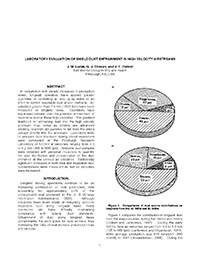Mining Publication: Laboratory Evaluation of Shield Dust Entrainment in High-Velocity Airstreams
Original creation date: February 2001
Authors: JM Listak, GJ Chekan, JF Colinet
NIOSHTIC2 Number: 20021367
2001 SME Annual Meeting, February 26-28, 2001, Denver, Colorado, preprint 01-144. Littleton, CO: Society for Mining, Metallurgy, and Exploration, 2001 Feb; :155-160
In conjunction with steady increases in production levels, longwall operators have applied greater quantities of ventilating air and spray water in an effort to control respirable dust and/or methane. Air velocities greater than 7.6 m/s (1500 fpm) have been measured on longwall faces. Operators have expressed concern over the potential entrainment of respirable dust at these high velocities. The greatest likelihood for entraining dust into the high velocity airstream may occur as shields are advanced allowing relatively dry particles to fall from the shield canopy directly into the airstream. Laboratory tests to simulate dust liberation during shield movement were conducted at the Pittsburgh Research Laboratory of NIOSH at velocities ranging from 2.0 to 8.2 m/s (400 to 1600 fpm). Airborne dust samples were obtained with personal impactors to quantify the size distribution and concentration of the dust entrained at the various air velocities. Statistically significant increases in both total and respirable dust concentrations were measured as test air velocities were increased.

NIOSHTIC2 Number: 20021367
2001 SME Annual Meeting, February 26-28, 2001, Denver, Colorado, preprint 01-144. Littleton, CO: Society for Mining, Metallurgy, and Exploration, 2001 Feb; :155-160
- Benchmarking Longwall Dust Control Technology and Practices
- Controlling Respirable Dust in Coal Mining Operations
- Controlling Respirable Dust in Underground Coal Mines in the United States
- Dust Considerations When Using Belt Entry Air to Ventilate Work Areas
- The Effects of Water Spray Placement for Controlling Respirable Dust and Face Methane Concentrations
- Field Evaluation of Air-blocking Shelf for Dust Control on Blasthole Drills
- Impact of Air Velocity and Support Advance on Shield-Generated Dust
- Laboratory Testing To Quantify Dust Entrainment During Shield Advance
- Performance of a Light Scattering Dust Monitor at Various Air Velocities: Results of Sampling in the Active Versus the Passive Mode
- Status of a Tapered Element, Oscillation Microbalance-Based Continuous Respirable Coal Mine Dust Monitor